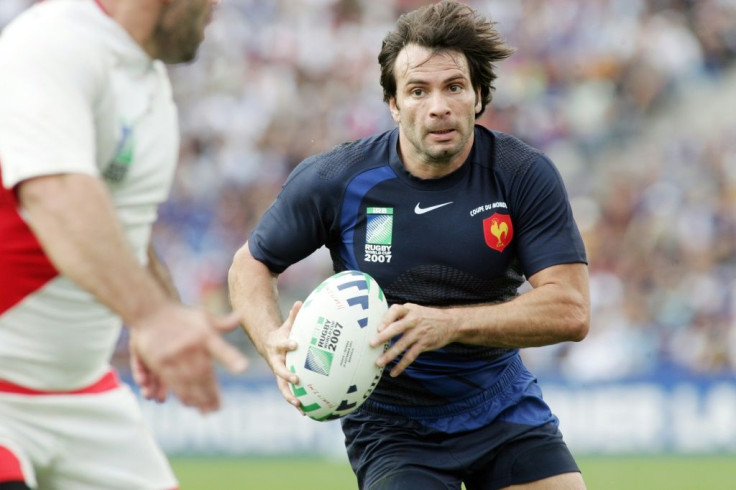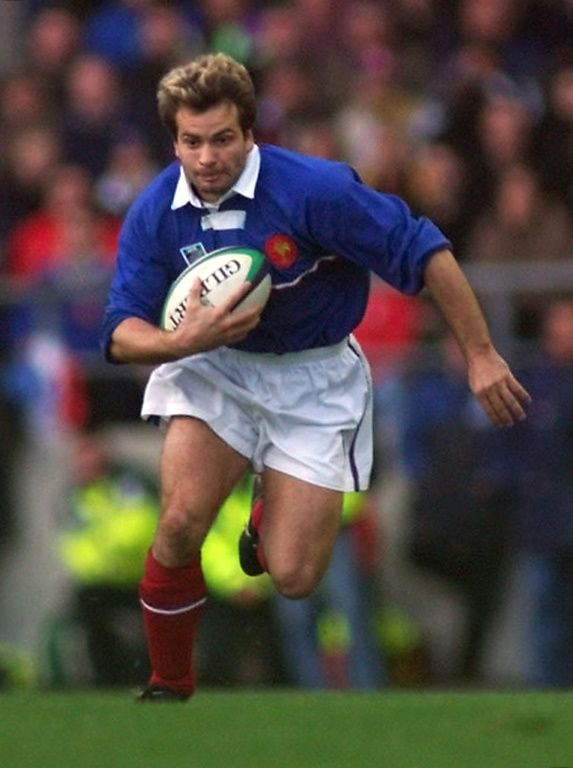Rugby World Mourns 'Genius' Dominici After Death At 48
Former rugby international Christophe Dominici, who was found dead at the age of 48 in a park near Paris on Tuesday, was undoubtedly one of the legends of modern French rugby.
The diminutive Dominici -- he was 1.72m and 82kg -- scored 25 tries in 67 Tests for France, including eight tries across three World Cups.
He had perfect balance, a deceptive change of pace and a shimmy that could lose and confuse defenders, as it did on October 31, 1999 when his try against a Jonah Lomu-fuelled New Zealand helped France to the greatest comeback in the history of the World Cup.
His second-half try in a remarkable semi-final, ducking between two All Blacks to grab a bouncing ball one-handed before skating down the left touchline, put the French ahead for the first time as they overturned a 14-point deficit to reach the final.
It was a try that caught the imagination of rugby folk around the world with Dominici coming to epitomise the fabled 'French flair'.
The head of the French Rugby Federation (FFR), Bernard Laporte, broke the news to the France squad preparing to face Italy on Saturday under the guidance of two of Dominici's team-mates in the famous 1999 game, hooker Raphael Ibanez and scrum-half Fabien Galthie.

"We were in a working session this afternoon... when Bernard Laporte informed us both of this terrible news. We are in shock," said Ibanez, now a France coach.
"Domi was a legend in our sport.He wore the blue jersey with so much energy, so much passion.
"Christophe is above all our friend. We experienced great and beautiful emotions together, on the field but above all as a team."
Head coach Galthie was visibly moved as he promised France would "pay tribute" to Dominici at the game against Italy.
The FFR described Dominici as "a legend and an emblematic player" who had "left his imprint on an entire generation of rugby".
Former players from around the world joined the tributes.
"Deeply saddened to hear of Christophe Dominici's passing. He was a star of 1999 @rugbyworldcup scoring a brilliant try in that thrilling semi-final & you had the feeling that something special would happen every time he took to the field. My condolances (sic) are with his family," tweeted Bill Beaumont, chairman of World Rugby.

Former Ireland captain Brian O'Driscoll, who faced Dominici several times, tweeted: "Very sad to hear of the sudden passing of Christophe Dominici. A French player full of flair with huge success throughout his career. May he RIP."
Dominici, who police said was seen by a witness jumping from the roof of a disused building in the Saint-Cloud park, also enjoyed a glittering club career.
He cut his teeth with Toulon in the south of France, where he was born, and then moved to Paris-based Stade Francais with whom he won the French championship five times.
Stade Francais described Dominici as a "rugby genius and peerless companion" on Twitter, adding that "he leaves a great void in our big family".
After he retired, then-national coach Laporte gave Dominici a coaching role. He also worked as a media pundit.
Off the field, Dominici suffered bouts of depression. In his 2007 autobiography, he admitted a personal loss had triggered depression and that he had been abused as a child.
He returned to the public eye in the summer when he fronted an Emirates-based bid to take over Beziers rugby club which petered out when the bid was rejected after a financial investigation by the league.
Always charming and personable, he could be unerringly candid with journalists.
"Life is well done," he said at the end of his outstanding international career.
"In the dramas that you go through, when you decide to go looking for things, you reach for them.
"When you don't want to go looking for them anymore, you're done."




















